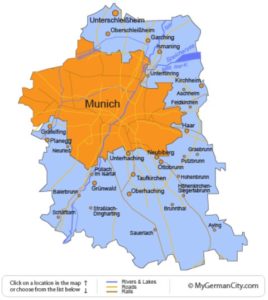18/03/2019
The European Boards of Appeal provide an independent review of decisions taken by divisions of the European Patent Office (EPO). In 2017, the Boards of Appeal moved from their central Munich location to the municipality of Haar. The purpose of the move was to increase public perception of their independence, as well as to increase efficiency and organisation. However, the move to Haar appears not to have been popular amongst the people who work there and attorneys who travel there for oral proceedings because of the inconvenience of the location.
In an extraordinary case, a Board of Appeal in decision T0831/17, has referred three questions to the Enlarged Board of Appeal, and one of these questions (question 3) specifically asks whether holding oral proceedings in Haar is contrary to the European Patent Convention (EPC). This question is therefore significant for future oral proceedings at the Boards of Appeal.
Background of the Case
During examination of a European patent application (application no. 10182497.7), Jostarndt Patentanwalts-AG filed third party observations relating to the clarity of the application. Regardless of these observations, the EPO issued a decision to grant the patent application. Ordinarily, Jostarndt Patentanwalts-AG could have filed an opposition within a nine month period after the decision to grant. However, clarity is not a ground for opposition. Therefore Jostarndt Patentanwalts-AG filed an appeal against the decision to grant.
According to the EPC, only adversely affected parties to the proceedings may appeal, which was not deemed to apply to Jostarndt Patentanwalts-AG. Therefore, the appeal was deemed to be inadmissible.
Jostarndt Patentanwalts-AG (as appellant) requested oral proceedings on the question of admissibility of the appeal. Subsequently, the appellant was summoned on 25 January 2019 for a hearing at the Boards of Appeal’s new premises in Haar.
Unexpectedly, the appellant requested transfer of the proceedings from Haar to Munich, because Haar is “not evidently intended as a place for acts or proceedings” according to the EPC.
The relevant Board of Appeal cancelled the hearing, and referred the following three questions (translated from German) to the Enlarged Board of Appeal to ensure uniform application of the EPC:
(1) In appeal proceedings, is the right to oral proceedings under Article 116 EPC restricted if the appeal is prima facie inadmissible?
(2) If the answer to Question 1 is yes, is an appeal against the decision to grant a patent prima facie inadmissible in this sense, which appeal has been filed by a third party within the meaning of Article 115 EPC and which has been substantiated by arguing that there is no alternative remedy under the EPC against a decision of the Examining Division not to consider the third party’s objections concerning the alleged contravention of Article 84 EPC?
(3) If the answer to one of the first two questions is no, can the Board hold oral proceedings in Haar without violating Article 116 EPC, if the appellant complains that this location is not in conformity with the EPC and requests that the oral proceedings be moved to Munich?
Questions 1 and 2 – Right to be heard
Question 1 considers a general idea of whether the right to be heard assumes that an admissible appeal is filed.
According to Art 115 of the EPC, a third party who presents observations on the patentability of an application is not party to proceedings. However, if the third party files an appeal, it becomes a party to the appeal proceedings.
According to Art 116, oral proceedings shall take place at the request of any party to the proceedings.
Based on these two articles, the referring Board of Appeal reasoned that even if an appeal filed by a third person which has no right to appeal under Art 107 (because it is not adversely affected by a decision), the third party is entitled to oral proceedings under Art 116. It appears that the referring Board considers that the answer to question 1 should therefore be “no”.
Question 2 more specifically considers the situation of the present case, that the third party (Jostarndt Patentanwalts-AG) alleges that it has an extraordinary right to appeal against the decision to grant because there is no other remedy available against the alleged infringement of Art 84 (lack of clarity) by the Examining Division. In the referral, the Board of Appeal reasoned that the question of the right to appeal and the limited number of grounds for opposition are clearly set out in the EPC.
If the Enlarged Board of Appeal answer “no” to either question 1 or 2, then the Enlarged Board of Appeal will have to decide whether Haar is an acceptable venue for oral proceedings.
Question 3 – Enlarged Board of Appeal Reviewing An Enlarged Munich
Question 3, which is perhaps of greater interest, requires the Enlarged Board of Appeal’s interpretation of “Munich”, and whether it includes the suburb of Haar. The map below illustrates the position of Haar in relation to the city of Munich.

The EPC makes a specific reference to the location of the EPO, and therefore the Boards of Appeal, at Article 6(2): “The European Patent Office shall be located in Munich. It shall have a branch at the Hague”. The Protocol on Centralisation also allows for a sub-office in Berlin.
In the referral, the Board of Appeal states that the decision in question depends on whether the President of the EPO or the Administrative Council of the EPO, either had the power to locate departments of the Office within the meaning of Art 15 EPC also outside the locations mentioned in Art 6(2) EPC including the Centralisation Protocol, or whether Article 6(2) of the EPC is to be interpreted as meaning that “Munich” is not the city of that name, but rather the greater Munich area.
If Haar is not considered to be in Munich, then the Boards of Appeal’s new location in Haar may be found to be contrary to the EPC. If this happens, perhaps the Boards of Appeal will need to return to their original offices in Munich. For the moment however, current and future oral proceedings before the Boards of Appeal are unaffected.
A decision from the Enlarged Board of Appeal is expected in roughly 18 months’ time, and we plan to keep you updated with any further news on this case.
This article is for general information only. Its content is not a statement of the law on any subject and does not constitute advice. Please contact Reddie & Grose LLP for advice before taking any action in reliance on it.

